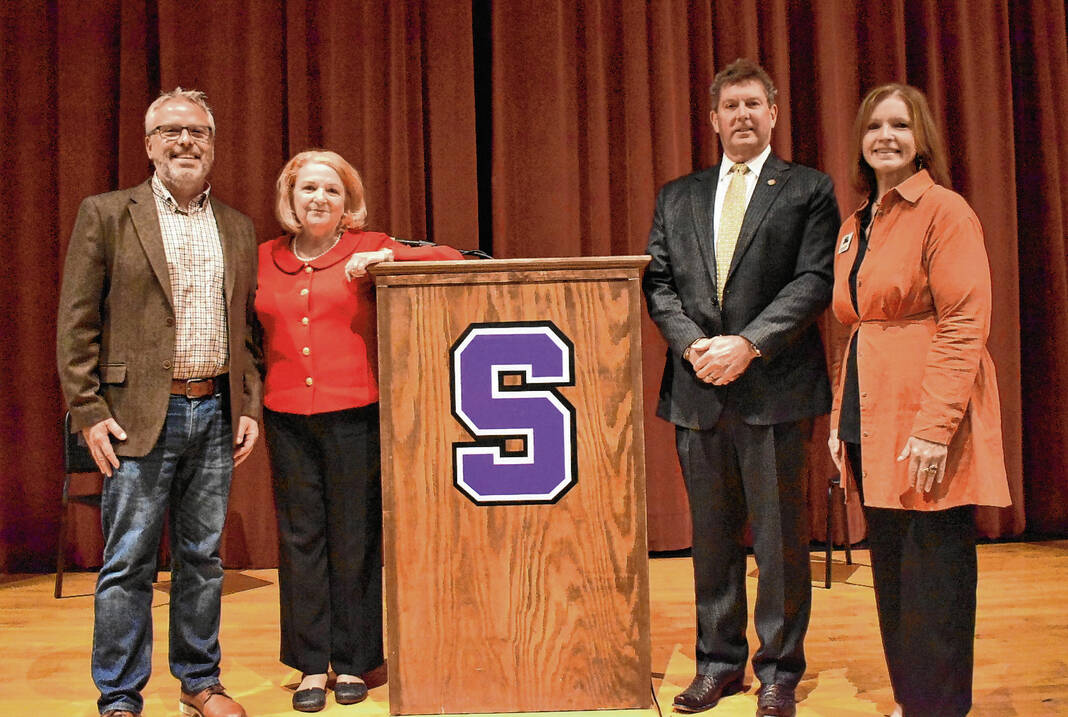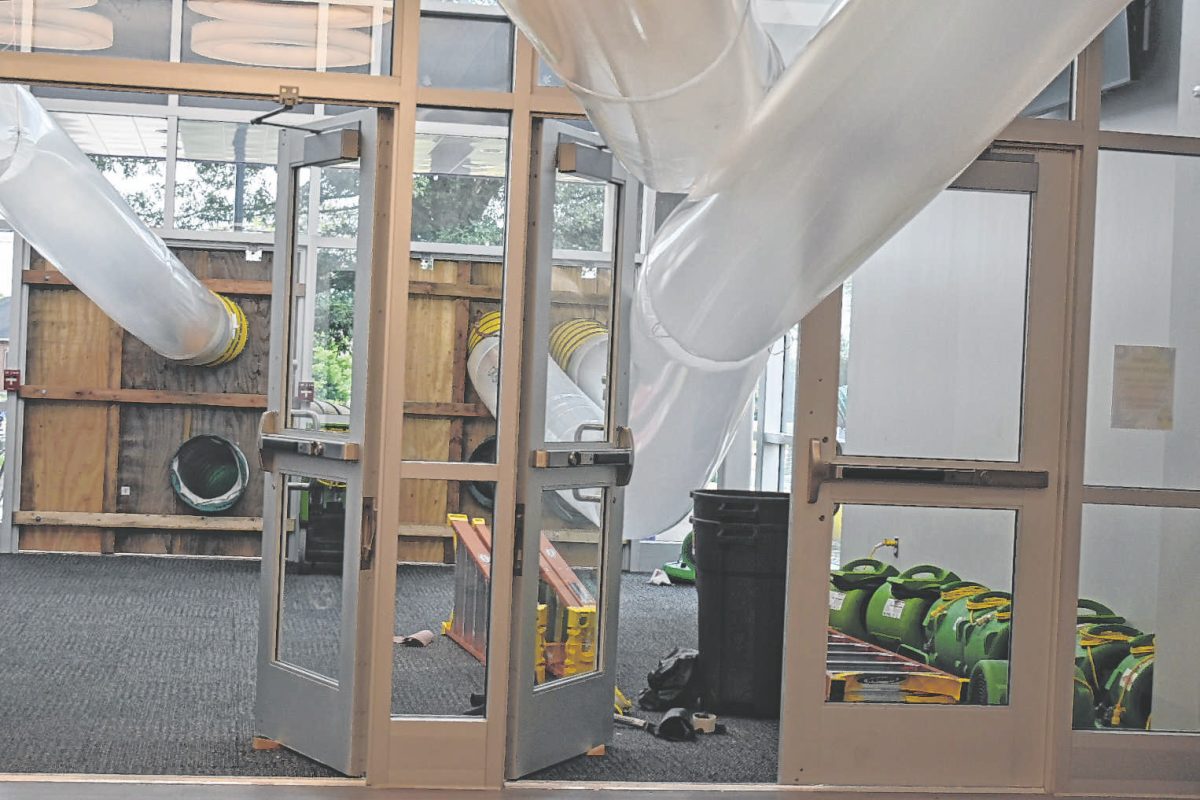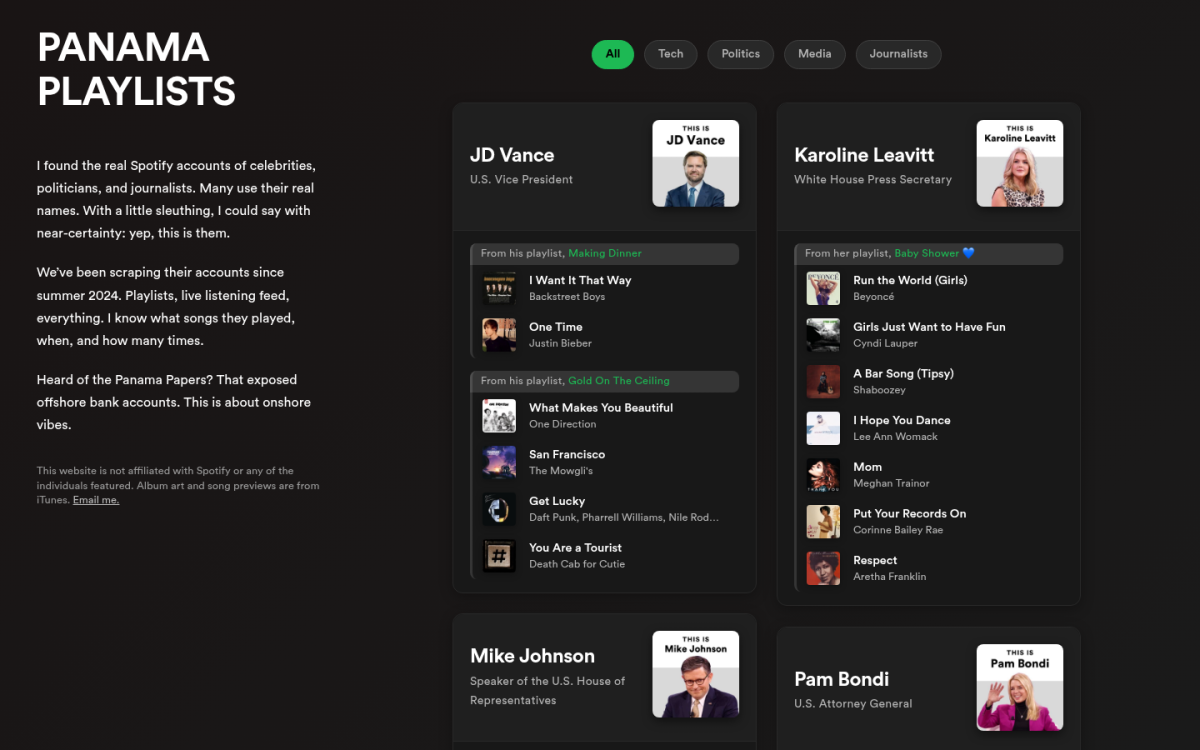On September 26, Trish Whitcomb and Jim Lucas had a debate to show what two possible futures are in store for Indiana. The candidates shared their positions and how they would want to help with issues such as education, healthcare, leadership, housing, and immigration.
The debate moderators were Dan Robinson, executive director of the Jackson County Chamber, and Arann Banks, executive director of the Jackson County Visitors Center. The rules were simple: 2 minutes to answer each question and 1 minute to rebuttal, and no questions were shared with the candidates. With the coin toss win, Whitcomb elected to speak second about the first topic.
The 2 candidates introduced themselves to start the night off. Lucas, first elected to the Indiana House in 2012, introduced himself and explained the importance of the positions in the Constitution. Jim said, “We are all required to swear an oath to the Constitution; it doesn’t matter if you are Democrat or Republican, Black or White, rich or poor, gay or straight. It doesn’t differentiate because we are all the same.”
Whitcomb then talked about her years working in the Indiana Department of Education and what she could bring to the position. “I’ve learned the importance of hard work, integrity, and standing up for what is right. This community shaped me, and that is why I am running now. We need a leader who leads with compassion and delivers real results.”
After the introductions were finished, the debate began with their first topic.
Education:
Jim Lucas said he prefers a “hands-off approach,” allowing parents to have a say in what and how their kids are taught. Lucas then said teachers can decide to a degree whether the material is harmful or sexually explicit and taught outside a particular age group. He then said, “We did not ban books; we took books that were not appropriate for the material being taught.”
Indiana HB 1447 passed in the final days of the 2023 session banning “harmful materials” to minors from school libraries. Violating the law could mean being charged with a Level 6 felony and facing up to two and a half years of jail time. The law defines obscene material as appealing to a passionate interest in sex, depicting or describing sexual conduct offensively, or lacking serious literary, artistic, political, or scientific value. Librarians cannot use the book’s educational value as a defense.
The American Library Association documented more than 4,200 unique book titles targeted for censorship in 2023. The 10 most challenged books in 2023 were challenged for themes of race and racism, seven because they contained LGBTQ+ content, and all because they were claimed to include sexually explicit content.
Whitcomb took a different approach, calling out Indiana’s “Water Down” licensing and how it has impacted classrooms. “When you have a situation where your educators are not well prepared, it can have an impact in the classroom,” she said. The input for parents is very important, but I think that input needs to be focused on their child and their progress.” Whitcomb also says she opposes standardized testing, saying it adds stress to educators and doesn’t inform school corporations well about learning progress.
To address teacher shortages, the legislature introduced a bill allowing school districts to request emergency permits in a content area where they are experiencing difficulty staffing with an adequately licensed educator. The applicant must possess a minimum of a bachelor’s degree from an accredited university to be eligible, and the permit is valid for one school year and can be renewed. According to the Department of Education, the state employed more than 6,200 emergency licensed teachers in 2022-up about 1,700 from the year before. It’s now nearly 10% of licensed teachers in the state.
The candidates then addressed the challenges the public school systems face as the population of students in which English is not their first language has recently surged. Moderators asked to keep solutions Indiana lawmakers can support at the state and local level without bringing up immigration law and border security.
Whitcomb said, “We want everyone to speak English in our country and our state when we have dual immersion where kids could learn two languages, which would benefit the community. The extra costs that may involve educating these kids it’s an investment we need to make.” Whitcomb also added the county needs immigrants and that people shouldn’t make fun of kids who can’t speak English and said, “Let’s put in the effort of making everyone a productive and engaging member of society.”
Lucas said that at the state and local level, lawmakers’ hands are tied due to federal policies that have been in place for the past few years, mentioning open borders. After an audience interruption, Lucas said the total school enrollment at Seymour Community Schools is 5,400, 1,900 English-learner students. Superintendent Brandon Harpe later told The Tribune that the enrollment numbers are pretty close but stated the school did not grow from last year, and the English-Learner enrollment has been stable. “It’s not just dual language. We have multiple languages; explain how one teacher can teach multiple languages in an elementary school setting,” Lucas said.
In March of this year, Cortland Elementary School considered a dual-immersion program in which kindergartners would receive bilingual education and learn content in Spanish. This program would have offset declining student enrollment and provided opportunities for students to become bilingual. Due to parent concerns, the school board dropped the proposal in April. “I support the parent’s right to choose their child’s education,” Lucas said in his rebuttal.
School Safety:
Continuing from the last topic, both candidates shared their stances on safety.
Lucas stated every school shooting in America has happened in a gun-free zone, “A gun-free zone is nothing more than a place where people who obey gun laws are made easy victims for people who don’t,” he said. This claim is missing context; according to the Associated Press, a common claim that more than 90% of all mass shootings have happened in “gun-free zones” comes from a study by a gun rights advocacy group. The study draws from federal data on “active shooter” incidents, which are not the same as a mass shooting.
Lucas mentioned that House Enrolled Act 1177, passed in 2013, allows Indiana schools to apply for state funding to train teachers and staff in firearm safety. “We simply gave them the ability to defend themselves; we have to have people there trained, armed, and ready to mitigate,” he said.
Whitcomb responded that legislators have had ample opportunity to pass sensible gun safety laws, including household storage requirements. Whitcomb recalled the recent incident that occurred at Crothersville High School, where a student was arrested for making bomb threats. “Stronger enforceable gun safety regulations regarding storage and responsibility of parents is the first thing I would do for school safety,” she said.
Lucas’s rebuttal was that adding more laws would not stop crimes from happening. “I am not advocating for no gun safety laws, but I am pointing out that laws do not stop bad behavior,” he said. “If it did, we wouldn’t have all of these crimes still being committed.”
Whitcomb also mentioned mental health assistance in schools is needed more than ever.
Healthcare:
Lucas said Medicaid is the fastest-growing line item in Indiana’s budget. According to a story from the Indiana Capital Chronicle, Indiana spends about 11% of its budget on Medicaid, lower than the national average of 17%. “We are seeing growth that we can’t control,” he said. We need to start getting people involved in their healthcare decisions, such as eating healthier, exercising more, and stopping smoking.
Whitcomb said more needs to be done about the lack of transparency in healthcare insurance regulations, which is why Indiana is ranked fifth in the nation for healthcare costs. According to a study conducted by the nonprofit policy think tank RAND Corp., commercial hospital prices in Indiana rank eighth highest in the country.
Lucas said the state is limited to what it can do without violating federal codes, but he then offered a solution for the state to look at the purchasing power and corporations. He added drug prices have skyrocketed since companies have been able to advertise directly to consumers.
Whitcomb had then brought up Senate Bill 8, which requires pharmacy benefit managers (PBMs) to pass on rebates they receive from drug manufacturers to patients or insurance companies, a bill Lucas voted against at the time. “For somebody who thinks individual choices in their healthcare are important to keep costs down, you would want to limit the information consumers get about prescription drugs,” she said.
Agriculture:
Solar farms and warehouses constructed on productive farm grounds have been utilizing new technology to increase yields for Hoosier farmers. Candidates gave their opinions on the topic.
Whitcomb said, “If you want to sustain and protect farmland, we need to give farmers a predictable and certain increase over time on property tax so that they can keep their farmlands in production.”
“We worked hard to keep property taxes down, but we see them spike like we have in the last few years, and it poses a challenge,” Lucas said.
Leadership:
The conversation moved to allegations of whether both candidates truly reside in District 69. Indiana Code states that a candidate for the office of representatives in the general assembly must “have lived” in the state for at least two years and “have lived” in the house district for at least one year.
Both candidates affirmed to the audience they legally reside within the boundaries of District 69.
In a follow-up question, Whitcomb said it’s important for the representative to live in the district and be involved in the community. She added that she travels frequently to meetings in Indianapolis, where her husband lives in a home they purchased. “I live here, and the reason I live here is because I want to help this community. I didn’t move down here to run for State Rep., but I did decide to run in May of 2023,” she said.
Lucas said he was born and raised in Seymour and that living in the district they represent is essential to knowing the community’s needs. “They should be there for them and listen to what they have to say,” Lucas said. “Simple question to me.”
Housing:
The candidates then expressed their views on homelessness and affordable housing and how to address them.
“Minimum wage earners are the minority of our population,” Whitcomb said. “If that wage is raised, everyone else will get a raise. It will not kill jobs, and we must ensure all work is honored and paid adequately so people can afford things.”
Lucas refuted this, saying that “throwing money” at the problem would not help.
“Homelessness is a horrible issue, but we have to help people that want to help themselves,” he said. “Mental health is a big factor of this as well.”
Lucas said the influx of people entering Seymour from outside the state and country is increasing housing costs as multigenerational living is rising.
According to the Pew Research Center, multigenerational living is a growing trend for several factors, including financial issues, lack of affordable housing, and caregiving. Multigenerational living is growing partly because groups that account for the most recent overall population growth in the U.S., including foreign-born, Asian, Black, and Hispanic Americans, are more likely to live with multiple generations under one roof. Multigenerational living, however, is also rising among non-Hispanic white Americans, who accounted for a share of the multigenerational household’s population growth from 2000 to 2021, 28%, then of total population growth, 9%.
There is no evidence to suggest that multigenerational living drives up housing costs; it can help families afford to buy or rent homes in expensive markets and reduce poverty.
Immigration:
The night had now moved to one of the most talked-about issues in Indiana, and the candidates talked about how they would help support first responders and the path to driving certificates.
Whitcomb says, “No problem has been solved by pointing the finger. A community must come together to pull resources and solve these problems. If we need more cops and EMTS, that is a local matter for the city to decide.”
Lucas said police are funded by local property tax, with two officers for every 1,000 residents. “We don’t know how many people are living in Seymour,” he said. “The closest guess I can come up with is 34,000, based on the school population, which is more than what the Census says.”
According to Census data, the current population in Jackson County is 46,200 as of 2022. 95% of the population are citizens, and 5.96% are foreign-born residents. Little information is available about the current population of undocumented people in the county.
“Until we can get control over how many people live here and start taxing accordingly, we will continue chasing our tail,” Lucas said. Lucas then added he is against providing driver certificates to residents who are undocumented. “I do not want to reward people that come into our country illegally,” he said. “Just because they get a certificate does not mean they will get insurance.”
According to an article from The Daily Reporter in Greenfield, auto insurance rates have been consistently rising in double digits year over year since Sept. 2022. In July 2023, the most recent month for which data is available, the increase from July was 18.6%.
Whitcomb said she is for giving people in the country a way to drive legally, access driver training courses, understand the laws of the road, and be insured. Whitcomb added that whether immigrants are here to seek asylum, which are allowed to legally work in the U.S. after six months, or on an H-2A Agricultural Visa, can work in the U.S. “They all pay sales tax for everything they buy and pay into Social Security that they will never access,” she said. “Having a group of employed newcomers in your district is a benefit.”
According to the Associated Press, estimates put the figure of immigrants in the U.S. without authorization at about 11 million. However, the figure could be slightly higher today, given recent border crossings. The Social Security Administration estimated 2010 that immigrants contribute $12 billion per year more to the Social Security system than they take out. While immigrants in the country without authorization do not have Social Security numbers, they can file taxes using an Individual Taxpayer Identification Number (ITIN).
Questions:
In the end, both candidates were able to question each other.
Whitcomb brought up House Speaker Todd Huston’s decision not to appoint Lucas to any interim study committees that convened in 2023 after he pleaded guilty to DUI crash misdemeanors. She asked Lucas how he would deliver to the community in a leadership position in which he is severely compromised.
“The media loves me, I know, and yes, I made the headlines,” he said, going into various controversial social media posts he made. “I did screw up last year, and I accept 100% responsibility for it. The lesson I learned from that has made me a better person and leader for the rest of my life.”
Lucas asked Whitcomb if she thinks Indiana’s economy’s current path is sustainable and if taxpayers should pay more for extra programs she wants to establish. “I am a fiscal conservative and want to follow in my dad’s footsteps,” she said. “He kept administrative costs down, cut the budget, and did not raise taxes.”
After the debate, The Tribune spoke with each candidate, and both said it went well.
Lucas said, “People must see two obvious choices of who they want to represent them. I am confident that the principles I stand for and upholding my oath to the Constitution will hold the government accountable to the taxpayer.”
“We are fortunate to have had the opportunity to speak to voters directly as not many legislators do,” Whitcomb said. “The voters have an obvious choice now after hearing myself and my opponent. I feel this may be a chance for a change in representation, and our district wants and deserves that.”














